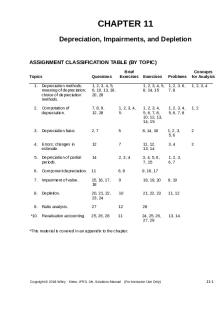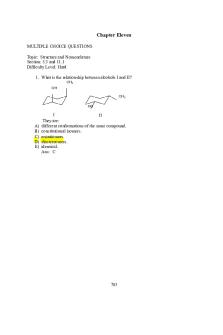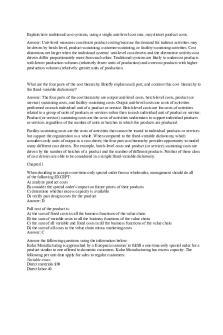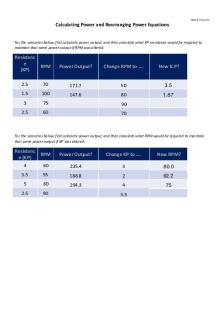Ch.11 Questions - Power PDF

| Title | Ch.11 Questions - Power |
|---|---|
| Author | ahmed wagih |
| Course | organzitional behavour |
| Institution | Misr International University |
| Pages | 5 |
| File Size | 89.6 KB |
| File Type | |
| Total Downloads | 30 |
| Total Views | 152 |
Summary
questions and answers of the chapter...
Description
Organizational Behavior Power - Chapter 11 Answer the following questions: 1. Power can be defined as _____. a. the ability to influence the behavior of others b. the actualization of the dependency of others c. congruence between the goals of the leader and those being led d. downward influence on one’s followers e. upward influence on one’s leaders 2. Which of the following statement is true concerning power? a. Trust and mistrust affect the expression of power. b. A person can have power over you only if he or she controls something you desire. c. Power requires some congruence between the goals of the leader and those being led. d. To be effective, power must be actualized. e. In order to have power, a person must impose their control over others. 3. Leaders achieve goals, and power is _____. a. defined by leaders’ hopes and aspirations b. usually used by poor leaders c. a means of achieving goals d. a goal in and of itself e. a strong influence on leaders’ goals 4. Leadership requires _____. a. some congruence between the goals of the leader and those being led b. strong two-way communication between the leader and those being led c. a dependency of those being led on the leader d. a dependency of the leader on those being led e. followers to share behavioral traits with their leaders
5. Leadership focuses on the _____. a. downward influence of a leader on his or her followers b. importance of lateral and upward influence patterns c. elimination of dependency relationships d. all of the above e. none of the above 6. Leadership research emphasizes _____. a. style b. persuasion c. power d. communication e. commitment 7. _____ power is based on an individual’s position in an organization. a. Leadership b. Formal c. Informal d. Influential e. Static 8. Formal power can arise out of which of the following? a. the ability to coerce or reward b. formal authority c. control of information d. all of the above e. none of the above 9. One reacts to _____ power out of fear of the negative ramifications that might result if one fails to comply. a. legitimate b. coercive c. punitive d. referent e. abusive
10. The opposite of coercive power is _____ power. a. referent b. reward c. legitimate d. charismatic e. resourcive 11. Legitimate power is based on _____. a. positive rewards b. interpersonal trust c. structural position d. expert knowledge e. respect and admiration 12. The power that the College Dean has been granted by the University over the faculty is termed _____ power. a. academic b. positional c. legitimate d. organizational e. balanced 13. When your superior offers you a raise if you will perform additional work beyond the requirements of your job, he/she is exercising _____ power. a. legitimate b. coercive c. reward d. personal e. reflective 14. ______ power is generally related to an individual’s unique characteristics. a. Personal b. Reward c. Legitimate d. Expert e. Idiosyncratic
15. Personal power is generally perceived as a result of all the following except---a. expertise b. charisma c. persuasiveness d. admiration e. skill 16. Your physician has advised you to take a series of medications. You comply because of her _____ power. a. referent b. information c. formal d. expert e. personal 17. Celebrities are paid millions of dollars to endorse products in commercials because the advertisers believe the celebrities have _____ power. a. personal b. referent c. expert d. legitimate e. star 18. Power tactics can be defined as _____. a. the only legitimate sources of power b. techniques for translating power bases into specific actions c. strategies for gathering and maintain support d. organizational structural characteristics e. approaches for winning arguments
19. Vivian has not been handling one portion of her duties in a satisfactory manner. As a result, her manager threatens to withhold her promotion. Which power tactic is being used? a. exchange b. ingratiation c. pressure d. personal appeals e. inspirational appeals 20. How is power defined? Power is a capacity that A has to influence the behavior of B, so that B acts in accordance with A’s wishes. This implies a potential that need not be actualized to be effective and a dependency relationship. Power may exist but not be used. It is a capacity or potential. A person may have power over you if he/she controls something you want. (Page 470) 21.Contrast leadership and power. Power does not require goal compatibility, merely dependence. Leadership, on the other hand, requires some congruence between the goals of the leader and those being led. A second difference relates to the direction of influence. Leadership focuses on the downward influence on one’s followers. It minimizes the importance of lateral and upward influence patterns. Power does not. Still another difference deals with research emphasis. Leadership research, for the most part, emphasizes style. It seeks answers to such questions as: How supportive should a leader be? How much decision making should be shared with followers? The research on power encompasses a broader area and focus on tactics for gaining compliance. Power can be used by groups as well as by individuals to control other individuals or groups. (Page 470-471)...
Similar Free PDFs

Ch11 - Practice Questions
- 9 Pages

LOUT CH11 Questions
- 1 Pages

Ch11-practice Questions
- 6 Pages

Ch11
- 28 Pages

Ch11 - ch 11 prep questions
- 41 Pages

Ch11 - Solution manual ch11
- 83 Pages

Ch.11 Questions - Power
- 5 Pages

Ch11 - kunjaw
- 95 Pages

Ch11 - dsdsdssssssssssssssssssssss
- 97 Pages

Ch11 - nice
- 16 Pages

Ch11 - accounting
- 49 Pages

Review ch11
- 3 Pages
Popular Institutions
- Tinajero National High School - Annex
- Politeknik Caltex Riau
- Yokohama City University
- SGT University
- University of Al-Qadisiyah
- Divine Word College of Vigan
- Techniek College Rotterdam
- Universidade de Santiago
- Universiti Teknologi MARA Cawangan Johor Kampus Pasir Gudang
- Poltekkes Kemenkes Yogyakarta
- Baguio City National High School
- Colegio san marcos
- preparatoria uno
- Centro de Bachillerato Tecnológico Industrial y de Servicios No. 107
- Dalian Maritime University
- Quang Trung Secondary School
- Colegio Tecnológico en Informática
- Corporación Regional de Educación Superior
- Grupo CEDVA
- Dar Al Uloom University
- Centro de Estudios Preuniversitarios de la Universidad Nacional de Ingeniería
- 上智大学
- Aakash International School, Nuna Majara
- San Felipe Neri Catholic School
- Kang Chiao International School - New Taipei City
- Misamis Occidental National High School
- Institución Educativa Escuela Normal Juan Ladrilleros
- Kolehiyo ng Pantukan
- Batanes State College
- Instituto Continental
- Sekolah Menengah Kejuruan Kesehatan Kaltara (Tarakan)
- Colegio de La Inmaculada Concepcion - Cebu



